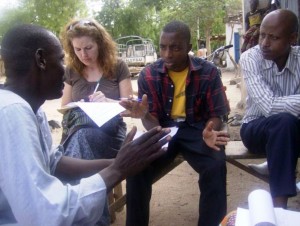 During a visit to Randy’s restaurant last week (no, that’s not the travel-ish part), I thoroughly enjoyed a conversation about Africa (that’s the travel-ish part) with my two companions. Seems a rather broad topic, you say? Well, yes, and we did have a rather broad discussion, ranging on education, investment, natural resources, transfer of technology, volunteerism, environmental issues and long bus rides. All this while I munched on my six-dollar tuna melt. We weren’t even drinking (when a glass of wine is $2.75, it scares me).
During a visit to Randy’s restaurant last week (no, that’s not the travel-ish part), I thoroughly enjoyed a conversation about Africa (that’s the travel-ish part) with my two companions. Seems a rather broad topic, you say? Well, yes, and we did have a rather broad discussion, ranging on education, investment, natural resources, transfer of technology, volunteerism, environmental issues and long bus rides. All this while I munched on my six-dollar tuna melt. We weren’t even drinking (when a glass of wine is $2.75, it scares me).
At one point, I brought up an observation made by Paul Theroux in his travel memoir, Dark Star Safari. Theroux is highly critical of the impact of foreign aid on Africa’s development. In the book, he notes that things looked much the same—or worse—in Malawi as they did when he was in the Peace Corps in the early 60s. While there, he’d participated in a teacher-training program, and when he returned in 2001, foreign workers were still running teacher-training programs. After 40 years, why aren’t Malawians running the programs, he wondered?
The debate over aid as a tool for dependency or empowerment has taken off in the past two decades as critics, development specialists, governments and others have tried to measure the long-term outcomes of providing help to Africa. Last week, the comment of one of my dinner companions got me thinking about this, however. She said, “The best thing I did as a Peace Corps volunteer in Ghana was teach confidence. Teach people that yes, they could do it on their own.”

Teaching confidence. Wow. How many aid programs focus on that? Confidence is part of one’s EQ (Emotional Intelligence Quotient), and a vitally important part of a human being’s toolkit for success—that goes for people in any part of the world. Yet when we deliver aid, and then we measure outcomes, we look for metrics that are quantifiable. How many teachers were trained? How many teachers got jobs after they were trained? How many students graduated? Often, we don’t know how to measure soft skills and EQ. And because grants and funding are so largely tied to outcomes, I have a hunch that there aren’t many aid programs designed around intangible outcomes like better soft skills. But here’s my question: what would happen to the impact of aid to Africa if programs always started with the guiding principle that development of a person’s EQ is a critical element of success and sustainability?
Another thing happened last week, this time in a conference room with a honking big Red Velvet cake: I wrapped up a three-and-a-half year term on the board of an organization called Burst for Prosperity. Of the many amazing things they do, one of my favorites is a program they pioneered called “Coaching for Prosperity.” Burst describes it like this on their website: “This training program takes a collaborative approach of focusing on the strengths of low-income adults rather than deficits by transforming the way caseworkers and other professionals work with clients.”
Basically, it’s executive coaching for social-assistance recipients, which is brilliant. Coaching stimulates confidence, creativity and chutzpah (and I can say this from experience, having benefited from it myself). It can be a very powerful experience when someone says to you, “Well, yeah, I absolutely see that (ability/skill/knowledge/strength) in you, you don’t see it yet? Let me show you… .”

I am never going to suggest a one-size-fits-all solution for Africa, I mean, jeepers, there are almost two thousand languages spoken there. Perhaps it’s time we try a “Coaching for Prosperity” approach as part of the global development aid strategy, though. Put less focus on showing people ‘how to’ and more on ‘hey, you’ve got it going on already, trust yourself to put it into action and see where you can go!’
Poverty is soul-crushing, and it makes people forget a lot of the good things about themselves. But those good things are still in there, and with the right fertilizer, I bet they could add up to a pretty fruitful harvest.
Has anyone heard about or been part of an aid program that works with EQ and soft skills like I’ve talked about here? Please tell me, I’m eager to know more. And as always, I love reading all of your thoughts and comments.
I knew someone working in Honduras with women who were creating their own businesses and having success.
Actually, multiple studies have shown that aid programs are more effective when administered ‘via’ women. The money is more likely to be returned to the household or reinvested, which in turn lead to greater growth in wealth.